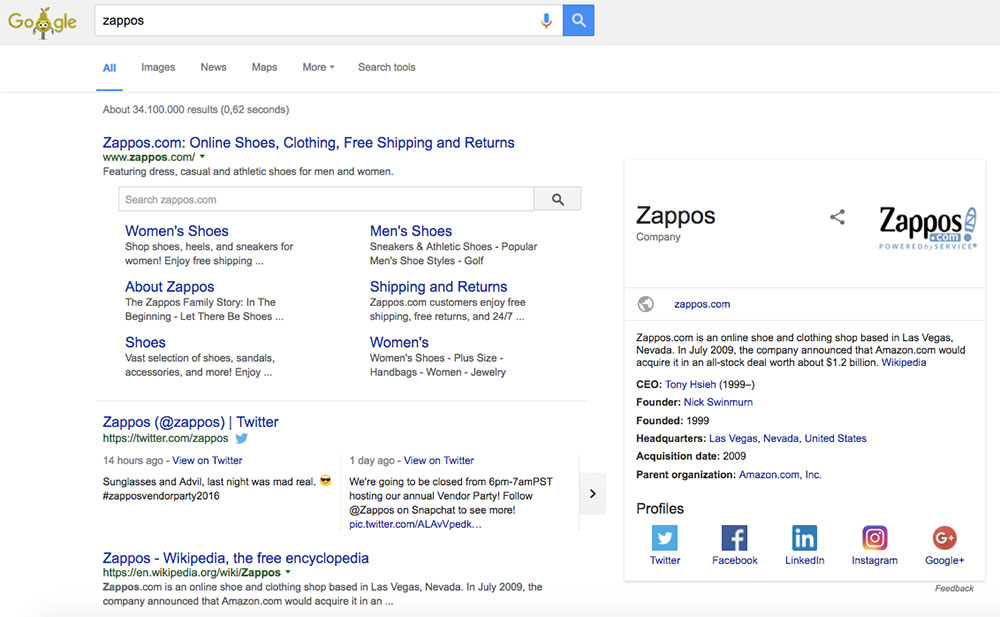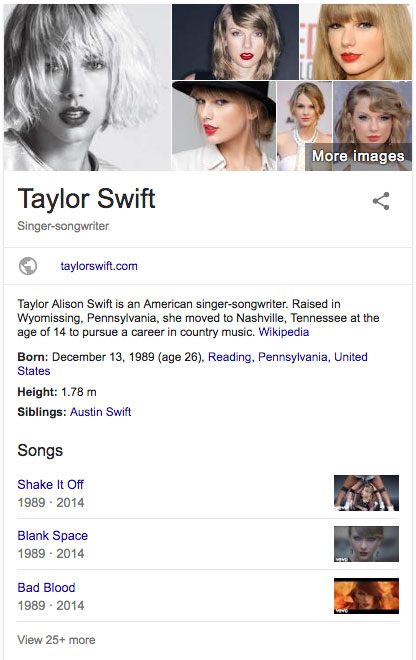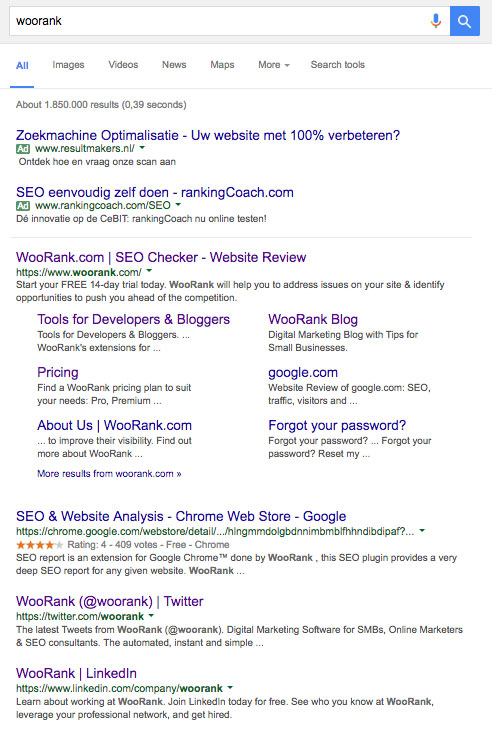
This article is part of an SEO series from WooRank. Thank you for supporting the partners who make SitePoint possible.
When the topic of off page SEO comes up, more often than not people are talking about link building. And with good reason. Building a backlink profile of quality links is one of the most important parts of SEO. However, off page SEO is more than just link building. There are several optimizations that take place off-page that contribute to your site's trust, authority and ranking in search results, as well as driving traffic.
In this piece we'll go over a few ways you can shape your site's off page factors to manage its appearance in search results, and ultimately increase its rank — all without building a single new link.
Google Knowledge GraphThe Knowledge graph is Google's attempt to enhance search results using semantic search information gathered from the web. In other words, it's Google's way of figuring out what you're searching for and providing that information directly in its SERP. For branded keywords, the Knowledge Graph is like a giant billboard in Google's search results. Getting your business or personal brand to appear in the Knowledge Graph is a way to jump right to the front page.

Some marketers dislike the Knowledge Graph because it sometimes links to other people's content and can lead to searchers bypassing your site, but it appears for branded keywords whether you want it to or not. In this case you can't beat them, so you may as well join them. Plus, in the end, if you do a good job optimizing your off page SEO, the benefits will outweigh the disadvantages.
So how do you make sure the Knowledge Graph for your brand is being displayed, and how do you optimize your content for it?
Google+The first step is to create a Google+ page for your business and pick a business type that best suits yours. When you create your page, use the brand name that people use when searching for you. So, for example, Recreational Equipment, Inc. would use the name REI when creating its Google+ page. If you aren't sure, check in Google Search Console or Analytics reporting to see which keywords generate the most impressions.
The stronger your Google+ presence, the more likely it is that Google with serve a Knowledge Graph rich snippet and include your feed in it. Keep your profile active by posting regularly and periodically run campaigns to generate +1s on your content. This will have the added benefit of telling Google what your brand is about, which will help to optimize the content in the rich snippet.
WikipediaWikipedia and Wikidata are probably the two most important non-Google sources for Knowledge Graphs, especially since Google migrated from Freebase. Google relies heavily on the data from Wikipedia to populate certain parts of the Knowledge Graph such as company type, description and details. Being listed on the Wikipedia family of sites, particularly the two mentioned above, gives Google a strong hint to show this information in a Knowledge Graph when a user searches for your brand.
If your company or personal brand doesn't already have an entry on Wikidata, create one now. Include the following information:
If your company doesn't already have a Wikipedia page, request one to be created. Getting your page accepted to Wikipedia can be difficult, especially when it comes to creating a page for your company, so be sure to follow their guidelines. Read through their Organizations FAQ section for more details on creating an article and disclosing a conflict of interest.
Google My Business ListingGoogle leverages its My Business listings heavily to get information for the Knowledge Graph and it's a great way to get your name, address and phone number (NAP) into search results. This is particularly important if you're a local business or rely on local SEO. In fact, having your correct NAP listed online is one of the strongest ranking signals for local search.
Do your best to generate some reviews as well, since the Knowledge Graph can include a review summary for local businesses.
YouTubeIf your company generates any multimedia content, add it to YouTube. This is particularly important for musicians or anyone else who produces videos as a revenue stream. Google relies on YouTube information to find and display data about songs and other video content. A search for Taylor Swift, for example, lists three of her most popular songs. Clicking these links brings users to the Google carousel, which displays YouTube videos posted to her official YouTube channel.

Social media and SEO is a bit of a murky subject. Google has explicitly stated that social factors, like Facebook likes and Twitter followers, don't play a role as ranking signals. So no matter how popular you get on social media, unfortunately, it won't lead directly to higher search rankings, and links from your social media profiles back to your site won't pass link juice. There are ways, however, that social media will impact on your SEO efforts.
1. Search engines crawl social media pages. As we mentioned previously, posting links to your page on Facebook, Twitter, YouTube and other social media sites is a way to get spiders to find, crawl and index your new website. If you've got a Pinterest account, include your URL in the descriptions of your pins.
2. Search engines index social media pages. If you search for WooRank, our Twitter and LinkedIn pages show up third and fourth in the results.

This is important because it helps keep users within your ecosystem, allowing you to move them through the conversion funnel.
3. Google has integrated Twitter feeds into its SERPs. It now displays Tweets in a carousel in its search results for branded keywords. This is true for both people and companies. They're served just below the news results, right at the top of the page. Like the Knowledge Graph, your tweets will allow you to jump to the top of the page for branded keywords.
4. Other search engines use social authority as a ranking signal. Just because Google doesn't take social signals into account when determining ranking doesn't mean it's the same rule used by everyone. In fact, back in 2010 Bing told Danny Sullivan at Search Engine Land that they do, in fact, determine the social authority of a user and use that to influence search results.
Yes, "search engine" is often just another word for Google when talking about SEO, but spending a little time on your social media presence to boost your rankings in the world's second largest search engine will help you in the long run. Plus, you never know when Google will start to use social signals for rankings.
Document SharingIf you've got documents that Google can't easily crawl, like a PowerPoint slideshow or a PDF, consider posting it to a document sharing site like SlideShare. Approach this content like you would any other content that you'd publish on your site: Start with keyword research to decide which you want to target and then optimize on page elements for those keywords. These elements include:
Using effective calls to action that point back to your site will then allow you to take advantage of SlideShare's ranking power. Links to your site may be nofollow, in which case you won't get link juice, but you'll still get your content to rank at the top of search results, earning it a huge audience. You can then use calls to action to get users to your landing pages and convert them there.
Citations are listings of your business' name and address on external web pages, normally a local business directory like a chamber of commerce or community group website. Make sure your NAP is consistent across all local citations, since consistent and correct NAP information is the most important local ranking signal. Conversely, incorrect or inconsistent NAP is the strongest negative ranking factor. Spending time making sure all your listings are correct is a tedious process, but it's very important.
Web directories used to be a common practice for SEOs looking to generate some easy backlinks. Unfortunately, this resulted in a lot of low quality, spammy directories that provided little to no value to users. However, if you submit your URL to quality directories like Best of the Web or Alltop, you'll make it easier for search engines to find and crawl your pages.
While reviews are most often discussed as a part of local SEO, they're an important element of off page SEO for any business. Positive business reviews instill positive brand awareness and trust, act as a citation for your business and help in conversion. In fact, 80% of customers trust online reviews as much as a personal recommendation (although they are concerned about fake reviews). Like with document sharing sites, putting your business on highly ranked review sites like Yelp will help get your name at the top of search rankings for keywords you would normally not necessarily compete or optimize for.
Sometimes called blog marketing or forum marketing, leaving comments on blogs, forums and question-and-answer sites is another old school SEO trick that, while not as effective as it once was, can still be used to your benefit. Most forums and blog comment sections automatically make all links nofollow links, but that doesn't mean they don't have any value. If you're participating in a discussion in a way that adds value or answers a question, you'll build your reputation as someone knowledgeable in your niche. Plus, if you're sticking to high-quality blogs and forums, Google will learn to associate your business with the right type of neighborhood which helps build up trust and authority.
ConclusionSo there you go: four off page SEO tactics that help you increase your rank and exposure without creating a single link. And the best part is that all of the elements we talked about are completely under your control, so there's no need for buttering up bloggers or in-depth outreach campaigns. And even better, since off page SEO is as much about developing brand exposure, awareness and reputation, not only will you get more traffic, you should also see more qualified traffic as well.
What off page SEO tactics do you use to build brand awareness and manage your online reputation? What's worked? What challenges have you encountered?
Source: Off Page SEO: Beyond Link Building
No comments:
Post a Comment